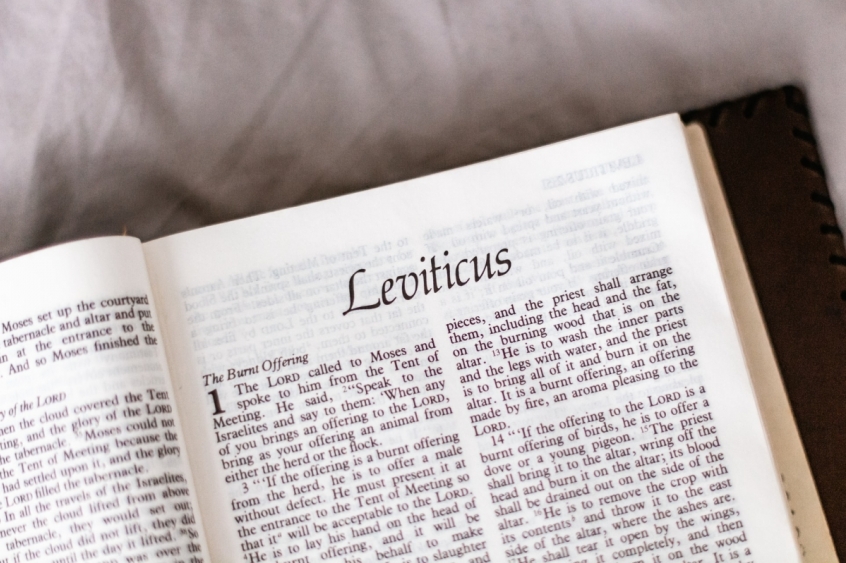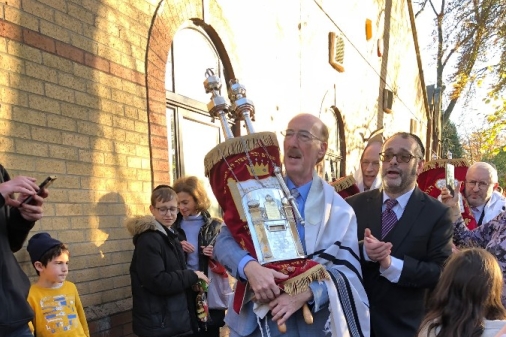
Jewish academic and Hebrew scholar Irene Lancaster examines the Pentateuch and its importance to both Judaism and Christianity.
One of the first reported accounts of a Jewish ceremony in the English language was given in 1663 by Samuel Pepys in his famous diary. Arriving at one of the new synagogues built in the wake of Oliver Cromwell's recent permission to the Jews to return after being thrown out of this country in 1290, Pepys lambasted the joyous Jewish festival of Simchat Torah, which signals the end of one cycle of learning Torah and the start of another.
First of all, Pepys didn't understand Hebrew and thought that the joyful service was being conducted in the 'Popish' language of Spanish or Portuguese (perish the thought). Secondly, he regarded the whole event as a riot rather than a religious festival, with singing, dancing, eating and drinking, rather than the sombre Protestant offerings to which he was accustomed (if at all).
For Pepys, as for many others through the ages, the Jews are a very 'peculiar' people, in the modern sense: negatively odd, rather than uniquely chosen to be in covenant with G-d.
All this has come to a head in recent years, with the Church of England increasingly supporting the idea of same-sex marriage and other developments which are regarded by observant Jews and many Christians as simply going against the tenets of the Torah and her commentaries.
To understand what the recent statements by the C of E, taken up with approval by some of the mainstream media, mean to the Jewish community, let's take another example.
The English language is a very rich mix of different linguistic sources and developments. One of the most obvious is what the English have gleaned from the French, who, as we know, conquered this country and ruled for a very long time.
A number of words are still used in both French and in English, but have gradually, for some reason, developed completely opposite meanings. One of the most obvious is the word 'pretend'. In French this still means to assert something, which may well be true, or not. In English, however, the word 'pretend' now means to say or do something which you know to be false.
The same thing has happened with our Biblical text, which for observant Jews (the fastest-growing everywhere in the world) is still regarded as a 'balm to the soul and a joy to the heart'. This love of the Torah text, all its writings - its letters, its appearance, and everything about it - is in contrast to the Church of England, for whom the Biblical text, and especially the Hebrew Bible (i.e. not the 'New' Testament), has gradually become an embarrassment to be used simply in pursuit of gaining more adherents for the state religion.
A bit like a rich old aunt in the attic who simply won't die, continues to make a great noise which nobody really listens to, and who stands in the way of the inheritance of the younger generation. The question is: do you let the rich old aunt simply fade away, or do you simply end up silencing her, in order to make you feel better?
And, interestingly, it is the most important section of the Hebrew Bible which comes in for particular contempt from the contemporary Church and its supporters. For these people, the prophets sometimes have their place, but only when they appear to support the latest enthusiasm taken up by the Church and her adherents.
But the Torah itself, known as the Pentateuch, the first five books, has become simply irrelevant to most, and especially the central book of the five, known in English as Leviticus, but in Hebrew as 'Vayikra', which actually signals G-d calling to Moses, His greatest prophet, telling him how best to live in community.
It has now been stated in the mainstream media that the Book of 'Leviticus' is the main impediment against the Church introducing drastic innovations to their historic, Bible-based teachings. And concrete 'evidence' has been supplied for simply ignoring that seminal Book of the Torah that simply does not exist in the Book of Vayikra.
It has also been stated as evidence in favour of overturning historic Church teaching that only the 'Old Testament' and not the 'New' are interested in such subjects. Jesus isn't interested (they state) in marriage arrangements. But, according to the NT itself, this is actually not the case.
And there are other factors which the leadership of the contemporary Church of England and its supporters in the media are conveniently ignoring.
One such is the fact that Jesus is quoted as stating that the most important injunction is to 'Love your neighbour as yourself.' But this wasn't a new idea. It is there in the selfsame Book of Leviticus - specifically Leviticus 19:18 - from the Hebrew Bible which the Church and others now wish to discard.
It is highly likely that before citing that Levitical injunction, Jesus would have read the surrounding verses, which tell us exactly how to love our neighbour. And it is these surrounding verses that the Church of England simply can't accept. For them, the Bible has become an open market of pick and mix religion, from which they cite whatever suits the present moment, as they battle in panic to save what is left of their failing institution.

Yet, knowing deep down that this conduct simply isn't becoming in a religion of State, the same state Church can't resist kicking the very matrix from which it stems, by encouraging adherents to completely disown the Torah and its teachings.
Then there is another reason given by many of the state Church's adherents for discarding these, for them, irrelevant bits of the 'dead' Bible. Since in the New Testament, Jesus doesn't mention a, b, or c..... it follows that Jesus must be in favour of a, b, or c. In other words, silence on a matter implies approval. But we all know that this is simply not the case. To take at least one obvious example, the NT does not mention environmental issues. Nowhere does the NT mention how to treat the earth on which we live.
Where in the Bible, if at all, can we find anything on the environment, for many contemporary pundits the burning question of the day? Embarrassingly to some, no doubt, all these subjects and more are discussed extensively in that very same Book of Vayikra, which, according to the contemporary state Church, is supposed to be obsolete. And, what is more, most, if not all, of the faith-based climate change organizations are Jewish. And yet, judging by the statements of various Christian leaders, one would believe that the Church and concern for the environment have always been intertwined.
By contrast, and in order to celebrate the end of Covid, the local Jewish community have just held a ceremony of dedication of a new Sefer Torah, sponsored by over 80 families. No doubt Samuel Pepys would have objected in theory, but on this occasion, even he may have ended up joining the throngs lining the streets in our area on the warmest, sunniest November day in living memory, taking turns to carry the beloved object under a chuppa, a marriage canopy, around the block and into the synagogue, where the celebration continued with more music, singing and dancing, a religious service and exhortations to carry on the learning forever and ever Amen. Oh, and with food and drink to follow!
This ceremony of dedication is based on the account of King David welcoming the Holy Ark into his capital, Jerusalem, which you can read in the Hebrew Bible: II Samuel 6:14. The ceremony is also based on the hakafot, dancing around the Torah, which is the hallmark of Simchat Torah, and the marriage ceremony under the chuppah. The joy was palpable and has lasted all week, at Shul, on Shabbat and beyond.
The Sefer Torah dedication linked past, present and future, mindful of all the Torah portions we are currently reading about Abraham, Isaac and Jacob, who represent innovation, consistency and the unknown respectively. Of all the 'deadly sins', envy must be one of the worst. And envy, as we saw in the Shoah, can lead to causeless hatred and near-total destruction.
So, if people want to destroy all they held sacred in the past, that is a very sad state of affairs. But please don't abuse the holiest part of the Jewish Torah in your fight against Biblical norms. It simply won't work in the long run.
As Rabbi Hillel, a contemporary of Jesus, told an earlier example of Church/State authority, when forced to do so by standing on one leg: 'Don't do to others what you wouldn't want done to you. That is the entire Torah. The rest is commentary: now, go and learn.'













